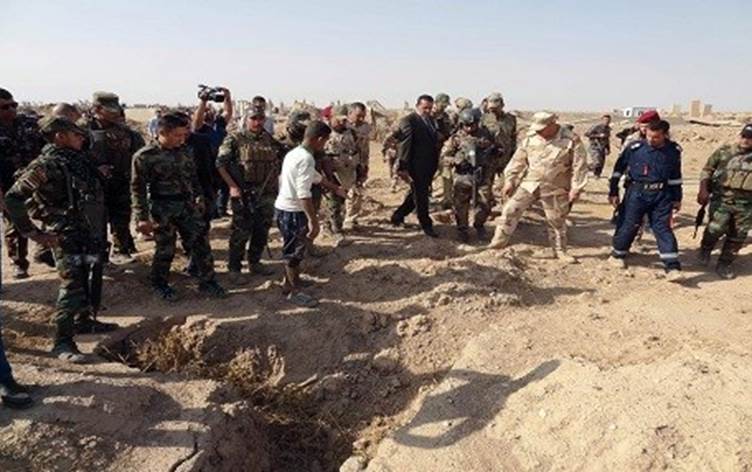ERBIL, Kurdistan Region – At least 400 suspected ISIS victims have been located in the militant group’s former stronghold of Hawija in Kirkuk province.
"The graves are a significant find, most of all for the families of the victims who have been seeking closure for years," said Al Jazeera’s Imran Khan on Saturday of the grave in the northern province of Kirkuk.
The suspected ISIS victims, wearing prison uniforms, were discovered at Rashad airbase, approximately 30 kilometers (19 miles) south of Hawija, which was used as an ISIS training camp and logistic base.
"According to locals, ISIL turned the military base into an execution ground,” Khan added. “Iraqi authorities have been cataloging exactly how many people died under ISIL rule and are now investigating how many victims are in these particular graves.”
The appointed governor of Kirkuk called on the Iraqi government and the Commission of Human Rigts to visit the mass graves and conduct DNA examinations to identify the bodies.
The operation to clear ISIS from the area known as the Hawija pocket southwest of Kirkuk began on September 21.
On October 5, the Iraqi army declared the town of Hawija liberated from ISIS, while operations continued east of the town.
An investigation into mass graves conducted by The Associated Press and announced in August 2016, concluded that between 5,200 and 15,000 people are buried in 72 mass graves in territory the militants formerly controlled within Iraq and Syria.
Kirkuk is a diverse and disputed province claimed by both Erbil and Baghdad. It is home to Kurds, Arabs, Turkmen and others of many religions.
"The graves are a significant find, most of all for the families of the victims who have been seeking closure for years," said Al Jazeera’s Imran Khan on Saturday of the grave in the northern province of Kirkuk.
The suspected ISIS victims, wearing prison uniforms, were discovered at Rashad airbase, approximately 30 kilometers (19 miles) south of Hawija, which was used as an ISIS training camp and logistic base.
Located in the Rashad Valley, the base was used by the Americans and known as Patrol Base Doria during US Operation Iraqi Freedom prior to 2011.
"According to locals, ISIL turned the military base into an execution ground,” Khan added. “Iraqi authorities have been cataloging exactly how many people died under ISIL rule and are now investigating how many victims are in these particular graves.”
The appointed governor of Kirkuk called on the Iraqi government and the Commission of Human Rigts to visit the mass graves and conduct DNA examinations to identify the bodies.
The operation to clear ISIS from the area known as the Hawija pocket southwest of Kirkuk began on September 21.
On October 5, the Iraqi army declared the town of Hawija liberated from ISIS, while operations continued east of the town.
An investigation into mass graves conducted by The Associated Press and announced in August 2016, concluded that between 5,200 and 15,000 people are buried in 72 mass graves in territory the militants formerly controlled within Iraq and Syria.
Kirkuk is a diverse and disputed province claimed by both Erbil and Baghdad. It is home to Kurds, Arabs, Turkmen and others of many religions.




Comments
Rudaw moderates all comments submitted on our website. We welcome comments which are relevant to the article and encourage further discussion about the issues that matter to you. We also welcome constructive criticism about Rudaw.
To be approved for publication, however, your comments must meet our community guidelines.
We will not tolerate the following: profanity, threats, personal attacks, vulgarity, abuse (such as sexism, racism, homophobia or xenophobia), or commercial or personal promotion.
Comments that do not meet our guidelines will be rejected. Comments are not edited – they are either approved or rejected.
Post a comment